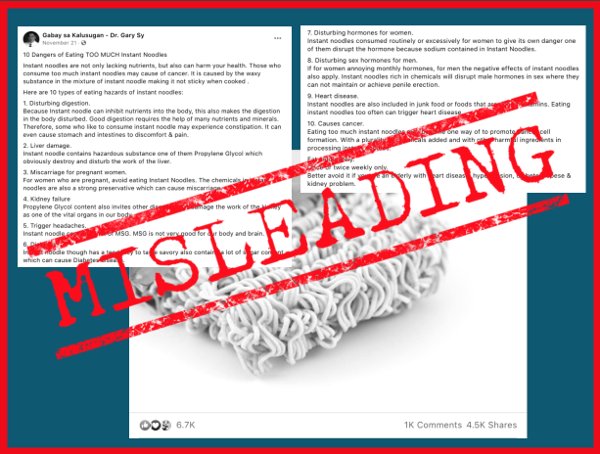A Nov. 21 Facebook (FB) status of a doctor, shared by over 4,500 people, is claiming that people who consume instant noodles too much may get cancer because of a “waxy substance” that prevents the noodles from getting sticky when cooked. This is unproven.
“The wax in noodles is mostly an urban legend,” Benjamin Gonzales, an assistant professor of food science from the College of Home Economics at the University of the Philippines Diliman told VERA Files Fact Check in an email interview.
Of 121 agents that are known carcinogens listed by the International Agency for Research on Cancer (IARC), none of them are found in most instant noodles, said Gonzales.
A similar claim from 2018 was disproved by fact-checking organization Australian Associated Press in January, where Gary Kennedy, a National Food Safety Auditor in Australia, said instant noodles do not have a wax coating.

The post now circulating in the Philippines was made on Nov. 21 by Gary Sy, a medical practitioner with a specialty in geriatric medicine, or healthcare of elderly people, in his FB page Gabay Sa Kalusugan – Dr. Gary Sy.
His post consists of a listicle titled “10 Dangers of Eating TOO MUCH Instant Noodles,” which appears to be a slightly altered version of an article published in August by a Ghana-based website called Opera News.
Sy’s post listed as number 10: “Eating too much instant noodles may become one way of to (sic) promote cancer cell formation. With a plurality of chemicals added and with other harmful ingredients in processing instant noodles.”
Gonzales said the antioxidant Butylated hydroxyanisole or commonly known as BHA, usually added in small amounts in instant noodles, is classified by the IARC as only “possibly carcinogenic.” This means it is not yet proven to cause cancer in humans.
He also said BHA is “generally recognized as safe” by various food authorities such as the Philippines’ Food and Drug Administration (FDA), the United States’ FDA, and the United Nations Food and Agriculture Organization (FAO), as long as used within specified limits.
Medical oncologist Necy Juat also told VERA Files that there is no conclusive evidence to prove that frequent consumption of instant noodles can lead to cancer.
“Previous studies may show some association between instant noodles and cancer, but (they are) not causative,” said Juat, who is also a member of the Philippine Society of Medical Oncology (PSMO).
Apart from the false wax claim, Sy’s post also carried multiple statements that were baseless, misleading, and other times, lacked context.
VERA Files talked to Grace Banal, a registered nutritionist and dietitian who manages a FB page that debunks misinformation about diets, to discuss the claims.
|
Claim
|
Rating |
|
Instant noodles have “a lot of sugar content” which can cause diabetes. |
False |
Instant noodles only have one teaspoon of sugar, which is equivalent to five grams of carbohydrates, Banal told VERA Files.
“That’s not a lot kasi (because) the regular person, usually, I recommend 3 teaspoons which amount to 15 grams of carbohydrates. So a pack of noodles containing sugar, or 1 gram of carbohydrates, is not a lot. Sobrang kaunti lang (It’s very little),” she said.
Gonzales also told VERA Files: “A serving of instant noodles contains less than 1/4 of the sugar in a glass of sweet beverages such as soft drinks and juices.”
|
Claim |
Rating |
|
Instant noodles “disturb sex hormones” of men to the point it cannot achieve penile erection. High sodium in instant noodles could “disrupt hormones” of women. |
Baseless |
No peer-reviewed studies support the claim that overconsumption of instant noodles has this particular negative effect on men and women. The post also provides no links to resources from which it supposedly got its information.
A study by Japanese researchers published in the Journal of Sexual Medicine in July 2020 showed that high salt intake “impaired” erectile function in salt-sensitive rats, but there are no studies of the same nature done in humans.
|
Claim |
Rating |
|
Instant noodles inhibit nutrients into the body, and may cause constipation and discomfort and pain in the stomach and intestines. |
Misleading |
Banal described the claim that instant noodles cause constipation as a “hasty generalization.” She said there is no conclusive evidence connecting consumption of instant noodles with constipation.
Constipation occurs when bowel movements become less frequent and stool is more difficult to pass, according to Cleveland Clinic, a nonprofit academic medical center.
Banal said the claim may have rooted from information that instant noodles lack fiber.
“When your diet is lacking in fiber, it may contribute to constipation. But (constipation) is multi-factorial. Constipation may be because you are not eating carbohydrates in general regardless if it’s high in fiber or not, or maybe it can be because of lack of physical activity, lack of water intake and we cannot zero it in from the consumption of instant noodles.”
|
Claim |
Rating |
|
Instant noodles contain propylene glycol that can destroy the liver functions and invites other diseases that damage the kidney. |
Misleading |
Propylene glycol is one of the additives permitted for use under specified conditions in certain food categories — including pre-cooked pasta and noodles — and is generally recognized as safe by the Philippine FDA.
Propylene glycol is the additive used to form the noodle but the amounts in food products are not generally considered harmful.
Even when you consume instant noodles often, it is difficult to reach a level of toxicity for propylene glycol, said Banal.
She said: “Even if you eat one pack of noodles everyday, you wouldn’t worry about propylene glycol, worry more about the sodium content which could lead to diseases like hypertension.”
|
Claim |
Rating |
|
Eating instant noodles too often can trigger heart disease. |
Partly True |
The World Health Organization (WHO) identified processed foods such as instant noodles as among the sources of high amounts of salt (sodium). High sodium intake can be one of the factors that increase risk for high blood pressure or hypertension, heart disease and stroke.
According to the WHO, when a person with hypertension eats food high in salt, the sodium in the salt increases blood volume, resulting in higher blood pressure.
|
Claim |
Rating |
|
Instant noodles contain “a lot of MSG” that could trigger headaches. |
Needs Context |
Monosodium glutamate, commonly known as MSG, is a food additive used to enhance flavor. An advisory issued by the Philippine FDA in 2013 declared MSG as safe, and that it was added by the WHO and FAO in its Codex General Standards for Food Additives, which sets conditions that permitted its use in foods.
The FDA noted that generally, there may be some people who are sensitive to MSG and advised the public to read labels before consuming food items.
Headaches are often a result of allergic reactions due to consumption of MSG, according to Banal. “Come to think of it (MSG) as sensitivity or as an allergy. Not all people experience allergy,” she said.
A systematic review of several studies about MSG administration on humans, conducted by two researchers from the Suzuka University of Medical Science in Japan and published in 2016, tried to explore a causality between MSG and headaches. However, a causal relationship was not proven.
|
Claim |
Rating |
|
The chemicals in instant noodles are also a strong preservative which can cause miscarriage among pregnant women. |
Inconclusive |
There are not much studies providing support on whether or not preservatives cause miscarriages.
Banal said, however, that this claim may have stemmed from the sodium content in instant noodle seasonings (and not in the noodle itself). High sodium intake was previously mentioned in this story as a contributing factor for hypertension.
Preeclampsia, a common cause of miscarriages, is a condition where pregnant women experience high blood pressure.
It is important to note, however, that the WHO and nonprofit academic health clinic Mayo Clinic, have said that eating less salt does not reduce risk for a woman to develop preeclampsia.
(Editor’s Note: VERA Files has partnered with Facebook to fight the spread of disinformation. Find out more about this partnership and our methodology.)





